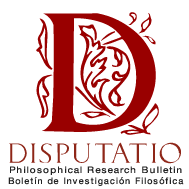Modesto Gómez-Alonso
Universidad de La Laguna, Spain | modestomga@hotmail.com
David Pérez Chico
Universidad de Zaragoza, Spain | davidpch@unizar.es
Received: 7-October-2019 | Accepted: 2-November-2019 | Published: 3-November-2019
Disputatio [Dec. 2019], Vol. 8, No. 11, pp. 293-325 | DOI: 10.5281/zenodo.3551611
Article | [SP] | Full Text | Statistics | Copyright Notice [sp] | Vol. 8 No. 11
How to cite this article:
Gómez–Alonso, Modesto y David Pérez Chico (2019). «Epistemología de goznes y escepticismo. Observaciones críticas a la tesis de la racionalidad extendida». Disputatio. Philosophical Research Bulletin 8, no. 11: pp. 293–325.
Abstract | In Extended Rationality (2015), Annalisa Coliva provides an important contribution to a family of possible views about epistemic justification which are mainly inspired by Wittgenstein’s notion of hinges. According to Coliva, the extended rationality view fares much better than alternative candidates of the same genus in dealing with the sceptical challenge as it is expressed by the Agrippan trope of arbitrary assumption. On the sceptical view, the fact that Wittgensteinian hinges are neither justified nor warranted would seemingly entail that they are not epistemically rational. It is the aim of this article to assess Coliva’s way of facing up to this challenge, as well as to show that Coliva’s arguments fall short of their target, or so it appears. One might say that, in spite of Coliva’s explicit claims to the contrary, her approach falls prey of a cognitive account of the notion of reason, and that her view is driven by the same illusion driving the sceptic: the uncritical adoption of a passive view of how the human mind is primarily related to the world.
Keywords | Constitutivism · Epistemic Justification · Primacy of the Practical · Rationality · Transcendental Deduction.
![]()
Epistemología de goznes y escepticismo: Observaciones críticas a la tesis de la racionalidad extendida
Resumen | En Extended Rationality (2015), Annalisa Coliva contribuye de modo significativo a la clase de teorías de la justificación epistémica que por su inspiración en la noción wittgensteiniana de goznes son comúnmente conocidas como ‘epistemologías de goznes’. Según Coliva, la tesis de la racionalidad extendida es capaz, frente a posibles competidores, de ofrecer una respuesta convincente al tropo escéptico de presuposición arbitraria. De acuerdo con el escéptico, del hecho de que los goznes wittgensteinianos carezcan de justificación o garantía parecería también seguirse que no son epistémicamente racionales. El objeto de este artículo es el de evaluar la respuesta de Coliva al reto escéptico, y el de mostrar la invalidez de sus argumentos. Podría decirse que, pese a las declaraciones contrarias de Coliva, su teoría contiene implícita una concepción cognitiva de la racionalidad, de forma que comparte la misma presuposición del escéptico: la adopción acrítica de una imagen pasiva de la relación primaria de mente y mundo.
Palabras Clave | Constitutivismo · Deducción trascendental · Justificación epistémica · Primacía de la práctica · racionalidad.
References
Bett, Richard (ed.) (2005). Sextus Empiricus. Against the Logicians. Cambridge: Cambridge University Press. doi: https://doi.org/10.1017/CB09780511815232.006.
Coliva, Annalisa (2015). Extended Rationality. A Hinge Epistemology. Basingstoke: Palgrave Macmillan. doi: 10.1057/9781137501899.
Coliva, Annalisa; moyal–sharrock, Danièle (eds.) (2016). Hinge Epistemology. Leiden–Boston: Brill. doi: https://doi.org/10.1163/9789004332386.
Cook, John (1985). «The Metaphysics of Wittgenstein’s On Certainty». Philosophical Investigations 8, no 2: pp. 81–119. doi: https: j.1467-9205.1985.tb00137.x.
Derose, Keith (1995). «Solving the Sceptical Problem». Philosophical Review 104, no. 1: pp. 1–52. doi: 10.2307/2186011.
Dilman, Ilham (1971). «On Wittgenstein’s Last Notes (1950–1951) On Certainty». Philosophy 46, no. 176: pp. 169–198. doi: 10.1017/S0031819100017241.
Engel, Morris (1970). «Wittgenstein and Kant». Philosophy and Phenomenological Research 30, no. 4: pp. 483–513. doi: 10.2307/2105631.
Engel, Pascal (2016). «Epistemic Norms and the Limits of Epistemology». En: Hinge Epistemology, editado por Annalisa Coliva y Danièle Moyal–Sharrock. Leiden–Boston: Brill, pp. 156–175. doi: 10.1163/9789004332386_010.
Enoch, David (2006). «Agency, Schmagency: Why Normativity Won’t Come From What Is Constitutive of Action». The Philosophical Review 115, no. 2: pp. 169–98. doi: 10.1215/00318108-2005-014.
Gómez–alonso, Modesto (2018). «Wittgenstein y la justificación de las proposiciones gozne». Estudios filosóficos 60: pp. 159–182. doi: 10.17533/udea.ef.n60a08.
Jenkins, Carrie (2007). «Entitlement and Rationality». Synthese 157, no. 1: pp. 25–45. doi: 10.1007/S11229-006-0012-2.
Kant, Immanuel (1781/2007). Critique of Pure Reason. Basingstoke: Palgrave Macmillan. [Traducción al inglés de Norman Kemp Smith, con una introducción de Howard Caygill y bibliografía de Gary Banham]. doi: 10.1017/S003181910004496X.
Malcolm, Norman (2001). Ludwig Wittgenstein. A Memoir. Oxford: Clarendon Press. doi: 10.2307/2182271.
Morawetz, Thomas (1978). Wittgenstein & Knowledge. The Importance of On Certainty. Amherst: University of Massachusetts Press. doi: https://doi.org/10.1017/S0031819100063889.
Newman, John Henry (1870/2007). An Essay in Aid of A Grammar of Assent. London: Burns, Oates & Co. doi: https://doi.org/10.1017/CB09780511718250.
Pritchard, D. (2016). Epistemic Angst. Radical Skepticism and the Groundlessness of Our Believing. Princeton–Oxford: Princeton University Press. doi: http://dx.doi.org/10.1590/0100-6045.2018.
Williams, Michael (1991). Unnatural Doubts. Epistemological Realism and the Basis of Scepticism. Oxford, UK–Cambridge, USA: Blackwell. doi: https://doi.org/10.1017/S0031819100040122.
Wittgenstein, Ludwig (1969/2004). On Certainty. Oxford: Blackwell. doi: 10.2307/2217581.
Wright, Crispin (1991). «Scepticism and Dreaming: Imploding the Demon». Mind 100, no. 397: pp. 87–116. doi: 10.1093/mind/C.397.87.
Wright, Crispin (2004a). «Wittgensteinian Certainties». En: Wittgenstein and Scepticism, editado por Denis McManus. London–New York: Routledge, pp. 22–55.
Wright, Crispin (2004b). «Warrant for Nothing (and Foundations for Free)?». Proceedings of the Aristotelian Society (supp. vol.) 78: pp. 167–212. doi: 10.1111/j.0309-7013.2004.00121.x.
Wright, Crispin (2014). «On Epistemic Entitlement (II): Welfare State Epistemology». En: Scepticism and Perceptual Justification, editado por Dylan Dodd y Elia Zardini. Oxford: Oxford University Press, pp. 213–247. doi: 10.1093/acprof:oso/9780199658343.001.0001.
© The author(s) 2019. This work, published by Disputatio [www.disputatio.eu], is an Open Access article distributed under the terms of the Creative Commons License [BY–NC–ND]. The copy, distribution and public communication of this work will be according to the copyright notice. For inquiries and permissions, please email: boletin@disputatio.eu.
